JUSTICE BEHIND THE IRON CURTAIN
Nazis on Trial in Communist Poland
In Justice behind the Iron Curtain, Gabriel N. Finder and Alexander V. Prusin examine Polands role in prosecuting Nazi German criminals during the first decade and a half of the postwar era. Finder and Prusin contend that the Polish trials of Nazi war criminals were a pragmatic political response to postwar Polish society and its desire for vengeance against German Nazis. Although characterized by numerous inconsistencies, Polands prosecutions of Nazis exhibited a reasonable degree of due process and were not unlike similar proceedings in Western democratic countries.
The authors examine reactions to the trials among Poles and Jews. Although Polish-Jewish relations were quite tense in the wake of the extremely brutal German wartime occupation of Poland, postwar Polish prosecutions of German Nazis placed emphasis on the fate of Jews during the Holocaust.
Justice behind the Iron Curtain is the first work to approach communist Polands judicial postwar confrontation with the legacy of the Nazi occupation.
(German and European Studies)
GABRIEL N. FINDER is an associate professor in the Department of Germanic Languages and Literatures and Ida and Nathan Kolodiz Director of Jewish Studies at the University of Virginia.
ALEXANDER V. PRUSIN is a professor of history at the New Mexico Institute of Mining and Technology.
German and European Studies
General Editor: Jennifer J. Jenkins
GABRIEL N. FINDER AND ALEXANDER V. PRUSIN
Justice behind the Iron Curtain
Nazis on Trial in Communist Poland
University of Toronto Press
Toronto Buffalo London
University of Toronto Press 2018
Toronto Buffalo London
utorontopress.com
Printed in Canada
ISBN 978-1-4426-3745-0 (cloth)ISBN 978-1-4875-2268-1 (paper)
 Printed on acid-free, 100% post-consumer recycled paper with vegetable-based inks.
Printed on acid-free, 100% post-consumer recycled paper with vegetable-based inks.
(German and European Studies)
___________________________________________________________________________
Library and Archives Canada Cataloguing in Publication
Finder, Gabriel N., author
Justice behind the Iron Curtain : Nazis on trial in communist Poland /
Gabriel N. Finder and Alexander V. Prusin.
(German and European studies ; 32)
Includes bibliographical references and index.
ISBN 978-1-4426-3745-0 (hardcover)ISBN 978-1-4875-2268-1 (paper)
1. War crime trials Poland History 20th century. 2. War criminals Poland History 20th century. 3. Nazis Poland History 20th century. 4. Holocaust, Jewish (1939-1945). 5. Communism Poland History 20th century. I. Prusin, Alexander Victor, author II. Title. III. Series: German and European studies ; 32.
KZ1174.5.F56 2018341.6'90268C2018-902035-0
___________________________________________________________________________
This book has been published with the help of a grant from the Federation for the Humanities and Social Sciences, through the Awards to Scholarly Publications Program, using funds provided by the Social Sciences and Humanities Research Council of Canada.
University of Toronto Press acknowledges the financial assistance to its publishing program of the Canada Council for the Arts and the Ontario Arts Council, an agency of the Government of Ontario.

Acknowledgments
The idea for this book began to germinate a decade ago. After several years of discussion and collaborative research and writing, that idea has come to fruition in Justice behind the Iron Curtain.
Trial records held in the archives of the United States Holocaust Memorial Museum (USHMM) in Washington, DC, and in the Institute of National RemembranceCommission for the Prosecution of Crimes against the Polish Nation (Instytut Pamici NarodowejKomisja cigania Zbrodni przeciwko Narodowi Polskiemu, IPN) in Warsaw form the backbone of our book. We wish to thank librarians Vincent Slatt and Megan Lewis for their generous help in identifying pertinent records among the USHMMs extensive archival holdings. We are particularly indebted to Tomasz Frydel, Katarzyna Person, Marcin Urynowicz, and Barbara Engelking for their magnanimous assistance in helping us obtain files from the IPN that are crucial to our study.
We also wish to express our thanks to Boena Szaynok, Jakub Tyszkiewicz, and ukasz Kamiski from the University of Wrocaw, who each checked our manuscript with a fine-tooth comb and made invaluable suggestions for improving it at the Fifteenth Annual Conference of Recovering Forgotten History: The Image of East-Central Europe in English-Language Academic Books and Textbooks, which was held in Poland in June 2017. We are grateful to Professor Andrzej S. Kamiski and the other coordinators of the conference for inviting us to participate.
We owe a deep debt of gratitude to Stephen Shapiro, Frances Mundy, and Richard Ratzlaff, our editors, who have so expertly and graciously shepherded our manuscript from its initial editorial stages to the finished product. It has been a pleasure to work with them and their colleagues at the University of Toronto Press. We would also like to thank Matthew Kudelka, our copy editor, and Noeline Bridge, our indexer, for their indispensible contributions to this text.
We would be remiss if we did not thank each other. This book has been a joint endeavour from start to finish. We were close friends before we started writing this book together. Were even closer friends now upon its completion.
We dedicate our book to Herbert Finder and to the late Victor Prusin, our fathers, men of courage and integrity.

Postscript: As this book was going to press, Alexander Prusin, my very dear friend and colleague, passed away suddenly and unexpectedly, his life cut short much too soon. Im heartbroken. Alex was like a brother to me. We met more than twenty years ago when we were both graduate students, just a few years after he had left the Soviet Union in search of breathing space in the United States. He delighted in his newfound personal and academic freedom. I was his first close friend in America and our friendship was cemented when we coauthored two articles early in our parallel careers. Academic writing in our field is generally a solitary enterprise. To write with another scholar is demanding: it requires mutual respect for each others viewpoints, openness to the strength of each others arguments, and willingness to find middle ground. So it was between Alex and me. Then we decided to write this book, which, over the course of a decade, demanded much, not least emotionally, of both of us, the children and grandchildren of Holocaust survivors and victims. It was, however, a labour of love. And now Alex wont be here to see our book appear in print; he should have been.
We dedicated our book to our respective fathers, Herbert Finder and the late Victor Prusin. Each of them survived the Second World War and the Holocaust, and they both rebuilt their lives in truly remarkable and admirable ways. Like our fathers, Alex was a man of courage and integrity, a good man, who learned from the pasts of men like our fathers to forge his own truly remarkable and admirable path in life. Now Alex is gone. I will sorely miss him. Our book is a tribute to his life.

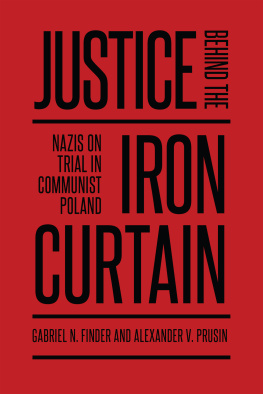

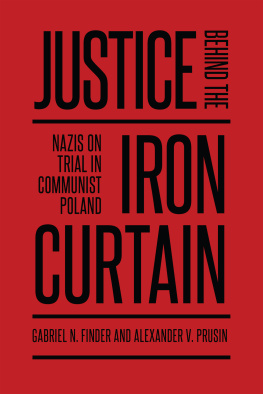
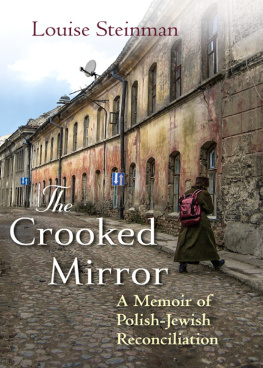
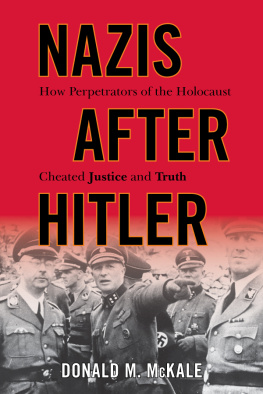
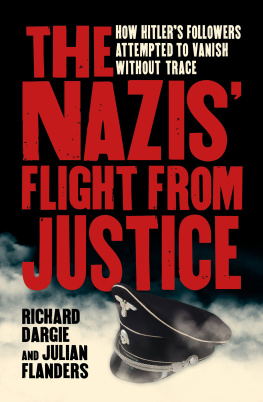
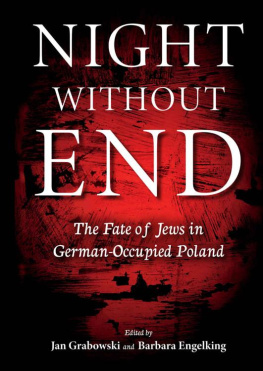
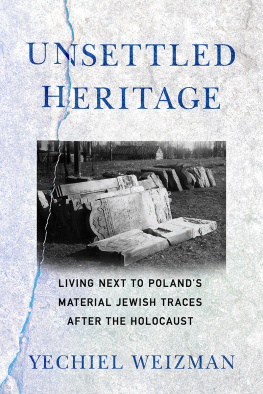
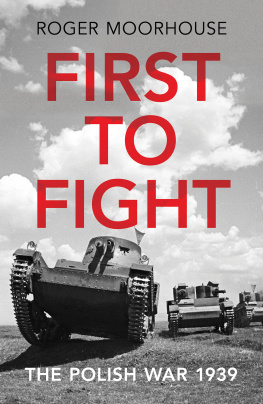
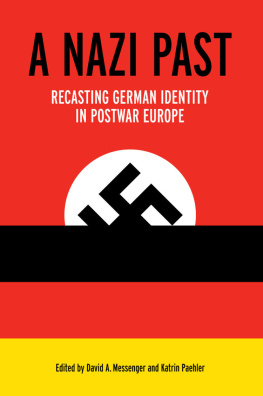

 Printed on acid-free, 100% post-consumer recycled paper with vegetable-based inks.
Printed on acid-free, 100% post-consumer recycled paper with vegetable-based inks.
